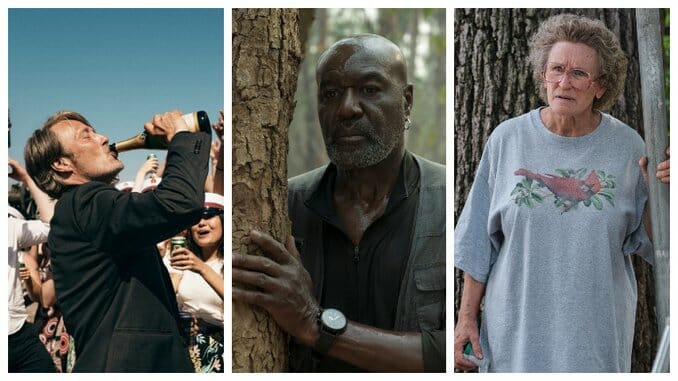Oscar Nominations 2021: The Good, the Bad and the Ugly

The 2021 Oscar nominations are finally out and that means the 2020-2021 awards season is finally coming to an end after an extended campaign that left it hobbling towards the finish line, with critical favorites damned by the Academy simply for coming out too early for them to remember after weathering a global pandemic. The nominees broke some notable diversity barriers, which is an especially heartening sign after criticism in recent years led to The Academy of Motion Picture Arts and Sciences doubling the number of women and people of color in its ranks with its latest batch of members last year.
That said, there were still the same problems that have always plagued the Oscars, as well as a few interesting flubs, snubs and even pleasant surprises. The younger, less white and male representatives of Hollywood are slowly altering what’s being honored (and presented to the general public as worthy of attention), but when Mank is your most-nominated film, you know the status quo isn’t going anywhere fast.
Here are the good, bad and ugly takeaways from 2021’s Oscar nominations:
The Good
The Academy Seems to Be Buying Another Round
Another Round, the Dutch-Swedish-Danish film about a constantly drunk Mads Mikkelsen, not only landed a spot in the International Feature category, but director Thomas Vinterberg (whose other Mikkelsen film The Hunt was also nominated in that category) snuck his way into a Best Director nomination alongside David Fincher, Lee Isaac Chung, Chloe Zhao and Emerald Fennell. Vinterberg also co-wrote the film, which sees Mikkelsen and his teacher peers experiment with maintaining a continuous buzz in a sort of boozy midlife crisis. While Mikkelsen’s excellent performance carries much of the movie, Vinterberg sees it through its impressive and varied arc: From the tipsy highs to its alcoholic lows, all the way to the downright epic dance number that closes things out.
Mank
Mank is fun to say and thanks to its ten nominations, it might be said a lot during the ceremony. Mank, Mank, Mank.
Almost All the Acting Picks
Aside from the diverse selection of actors, whose list of historical firsts is almost as long as the list of nominees, the quality of the acting here is top-notch. Three of our ten breakout performances of the year earned Supporting Actor nods: Borat Subsequent Moviefilm’s Maria Bakalova, Minari’s Yuh-Jung Youn and Sound of Metal’s Paul Raci. Anthony Hopkins and Steven Yeun offer powerful dramatic turns, while Riz Ahmed masters multiple layers of physicality to sell his ASL-learning drummer. Nominees Andra Day, Vanessa Kirby, Carey Mulligan and Amanda Seyfried are all the best parts of their respective films. While I still liked Viola Davis in Ma Rainey’s Black Bottom, Chadwick Boseman, posthumously nominated for Best Actor, gave his best performance yet—“an Oscar-worthy snapshot of potential and desire.” Frances McDormand’s Nomadland performance was a shoo-in, and it’s exciting to see LaKeith Stanfield and Daniel Kaluuya honored…even if the circumstances are strange.
“Husavik”
Collective Double Dips International and Documentary Nominations
One of our best movies and best documentaries of the year, Collective is “a testament not to the power of journalism, but to its necessity, one of the last bastions civilization has against normalizing this nightmare here at the End of History.” The film from Alexander Nanau covers the aftermath of a deadly Bucharest nightclub fire and the systemic rot in Romania’s government and healthcare spheres. Its double nomination marks the first-ever Oscar nod for Romania and only the second time a film’s landed noms for both categories (Honeyland lost both in 2019).
Apple Arrives
With an Animated nomination for its staggering Wolfwalkers and a sound nod to its far less staggering (but decent) Greyhound, Apple earned its first Oscar nominations. It’s a latecomer to the streaming originals battlefield, but with a healthy percentage of its sparse original offerings being at a high quality, Apple is still making waves—and at a notable pace, considering that when Netflix earned its first Oscar nomination in 2014 for The Square, it only got one.
The Bad
Another Spike Lee Film Snubbed
Da 5 Bloods, Spike Lee’s ambitious post-Vietnam film starring a knockout ensemble with a particularly potent performance from a go-for-broke Delroy Lindo, got a single Oscar nomination: Best Original Score. While composer Terence Blanchard’s work is great, it’s likely that the voters were mostly into all the Marvin Gaye that the film uses on its soundtrack (which isn’t what the category is about). Using so much of What’s Going On is a flashy move, one of many big style choices Lee pulls off in the film, and one that absolutely wouldn’t work without Lee’s direction, the script’s big ideas and its ensemble’s energetic devotion to pulling it all off. You know, all the things the Academy ignored.
Glenn Close Rewarded For Bad Behavior
In one of the clearest, most cynical awards grabs in recent memory, Hillbilly Elegy’s dull string of shouting matches create a parody of an Oscar-nominated film, with Close’s Mamaw one of its most egregious elements. There’s a terrible tradition of rewarding actors for getting “uglied up,” with an erroneous designation of bravery attributed to anyone playing any relatively unflattering role. There’s an even worse tradition of applauding performances that are less characters and more collages of actorly affectations—that whole “it’s not about the best acting, but about the most acting” thing. Close doesn’t even give us the most acting, though, with lazy strings of silly line deliveries and a single facial expression plastered throughout her one-note performance. To paraphrase my review, Close is always reminding us that yes, it really is her in that Walmart T-shirt.
Regina King’s Unappreciated Directorial Prowess
The excellent One Night in Miami wasn’t just a showcase for one of the best ensembles assembled this movie season, but the directorial debut of Regina King. Her film earned nominations for Leslie Odom, Jr., its script and its original song “Speak Now,” but nothing for King—the person keeping it all together. A film like that, where its ensemble is its key, relies so much on its director to keep things in control, that ignoring King (especially in such a stunning first effort) feels foolish.
The Ugly
Hillbilly Elegy’s Oscar-Nominated Wigs
Hillbilly Elegy joins Suicide Squad and Norbit in the Oscar-nominated dregs of hair and makeup. The Academy’s been locked down too long and has forgotten what human hair looks like.
The Lead-Free Judas and the Black Messiah’s Two Supporting Actors
I know there are layers of marketing savvy, politicking, and awards gerrymandering at hand, but it feels awfully silly to make Daniel Kaluuya and LaKeith Stanfield—the two central men at the heart of Judas and the Black Messiah—compete against each other in the Supporting Actor category. Submitting them there because they had a higher chance of actually getting the Supporting nominations is a bit crass (especially seeing as WB campaigned for Stanfield as its lead), even if I’m happy the pair were honored for their work. Newcomers to the movie will see these two designated as supporting, watch the film and wonder “Supporting who, exactly?”
First Cow, The Assistant and Other Early Entries Left Behind
It’s one thing to acknowledge a film with a cursory nomination or to ignore a better aspect of a movie in favor of a flashier one, but leaving films behind entirely because they simply premiered too early in the year is a problem that’s not unique to 2020-2021, but one exacerbated by its extended season. Two of the best films of the year, The Assistant dropped in January of 2020 and First Cow in March of 2020. Both were completely shut out, and their distance from the current cultural conversation looks like a primary culprit. While a sharp film in its own right, the domination of Judas and the Black Messiah (released just over a month ago) in top categories is a prime example of how recency bias can affect nominees.







































